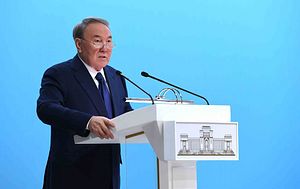Last month, we covered the arrest of Kazakhstan’s former Minister of Economy Kuandyk Bishimbayev and his alleged accomplices, who all served in high-ranking positions at state-owned enterprises. Bishimbayev is accused of having embezzled state funds and having taken around $3 million in bribes in relation to the construction of a glass factory near Kyzylorda, in central Kazakhstan.
Regular purges of “bad apples” are common in Kazakhstan, but the latest wave of arrests is somewhat unique and follows the new directive aimed to boost the powers of the Security Services in cracking down on corruption.
Kanat Sultanbekov, former deputy chairman of Kazakhstan Engineering, was detained for two months on February 22, one week after the board of the company sacked him. The court did not disclose the reason for the arrest. Kazakhstan Engineering is one of many state-owned enterprises administered through the holding Samruk-Kazyna.
Two civil servants were arrested for taking bribes at the beginning of February in northwestern and northeastern Kazakhstan. A week later, the chief of the Kostanai branch of the Ministry of Interior was detained as he was accepting a $3,000 kickback. Just ten days later, two civil servants were arrested in the northern Akmola region and in Almaty for more bribe-taking. The head of the northern Petropavlovsk branch of state-owned road works company KazAvtoZhol was arrested for graft.
Another anti-corruption agency – part of the Presidential Administration – will impose disciplinary action against the Kazakh ambassador to Poland, Altai Abibullayev, for an unspecified violation of the law on public service.
As well as cracking down on dishonest officials, the renewed push against corruption has caught several opposition activists in its net.
Accused of money laundering, activist and editor Zhanbolat Mamay was arrested on February 10, and the news was received as yet another case of using pretextual charges to silence the opposition. In particular, the incident also seemed related to exiled oligarch Mukhtar Ablyazov, who had supposedly used Mamay’s newspaper Tribuna as a front to launder money. Ablyazov, a staunch opponent of President Nursultan Nazarbayev, is wanted in Kazakhstan for having allegedly embezzled billions of dollars from BTA Bank. Captured in France in 2013, he was recently released from custody.
Tribuna has faced suspensions and fines before, especially after carrying news pieces that uncovered uncomfortable links between powerful figures and shady deals. In the country, it was seen as one among few opposition outlets.
While in jail, Mamay filed a complaint through his lawyer that he had been mistreated and beaten. In the following days, other activists joined a campaign for his freedom, but were detained before being able to stage a small demonstration in front of the Security Services headquarters in Almaty.
Human rights watchdog Amnesty International said this is only Kazakhstan’s latest attempt to silence opposition media. Over the past couple of years, even seasoned newspaper editors, such as Guzyal Baydalinova and Seitkazy Matayev, were not immune from prosecution.
“The arrest of Mamay is another attack on freedom of expression,” Denis Krivosheyev, deputy director of Amnesty’s Europe and Central Asia department, said in a note.
In the meantime, activists and trade union representatives in the west of the country have also been detained. Prominent labor leaders Amin Yeleusinov and Nurbek Kushakbaev were arrested in late January and sent from the oil town of Aktau to a detention facility in Astana, over 1,000 miles away. They were charged with illegally organizing a hunger strike among their fellow workers. And, according to local sources, pressure on activists continues as another activist was detained for several hours and questioned about her campaign against proposed constitutional amendments that would impact land ownership. Protests against this measure ignited the largest protests in the history of independent Kazakhstan last year.
The president would ideally want Kazakhstan to live quiet years until he retires from politics. According to his own words, this will be Nazarbayev’s last term as president. He has served as father of the nation since independence in 1991. Whether he will retire or not, however, is still an open question.
If on the one hand the purge against corrupt public officials appears a genuine attempt to level the field before a transition of power can be discussed by the elites, on the other hand, it seems to be accompanied by even harsher measures of repression of political opposition. Certainly, giving more powers to the Secret Services in their anti-corruption drive will ensure that the leadership will also have carte blanche when targeting uncomfortable activists.

































